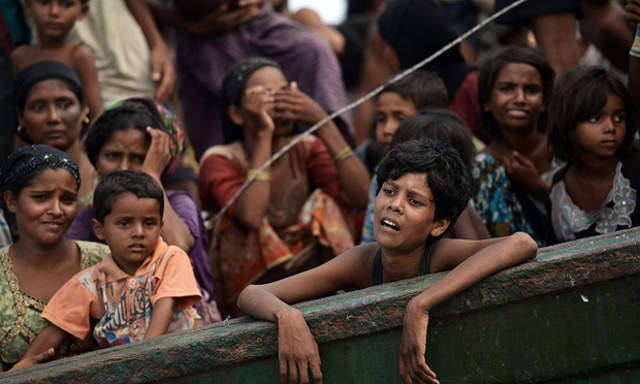The European Union will launch the 'active phase' of its military operation against people smugglers in the Mediterranean Sea on 7 October.
Following the first, intelligence-gathering phase of EUNAVFOR MED, this next stage will see EU naval forces being able to board, search, seize, and divert vessels suspected of being used for human smuggling or trafficking on the high seas.
This phase of the operation will be renamed Operation 'Sophia', "after a baby born on the ship of the operation which rescued her mother on 22 August 2015 off the coast of Libya", a European Council statement said.

Image: Christophe Archambault/AFP/Getty Images
The decision to launch this active phase was taken this week by the Political and Security Committee following a council assessment on 14 September that "the conditions to move to this stage have been met".
The statement said that the operation's commander, Rear Admiral Enrico Credendino, "judged the transition possible as member states provided the assets needed for this more active phase in the force generation conference of 16 September 2015".
The European Council said that Operation 'Sophia' will be conducted "in line with international law", citing a raft of laws, including SOLAS, the UN Law of the Sea, and the International Convention on Maritime Search and Rescue.
Ships operating under this second phase will thus be obliged to "assist persons in distress at sea and to deliver survivors to a place of safety", and vessels assigned to the operation "will be ready and equipped to perform the related duties under the co-ordination of the competent Rescue Co-ordination Centre", according to the 15 May Decision.
About 22 of the EU's 28 member states will take active part in the Operation 'Sophia'. Denmark will not take part, either actively or financially, as it does not participate in EU actions that have "defence implications".
Rear Admiral Cristiano Aliperta of the Italian Coast Guard said that from January to the beginning of September this year, 438 merchant ships had been diverted by Italy's Maritime Rescue Co-ordination Centre headquarters (IMRCC). Of these, 133 merchant ships had rescued 15,189 migrants/refugees. He explained that the IMRCC may divert many ships to an area but eventually use only a few of those "according the number of targets (migrant boats) and migrants to be rescued" - an operational tactic known as "prudential modus operandi".
The number of people rescued so far this year by all rescuers, including coastguards, navies, Operation 'Triton', merchant ships, NGOs and others, is 130,000, said Rear Adm Aliperta.
Source: ihsmaritime360.com